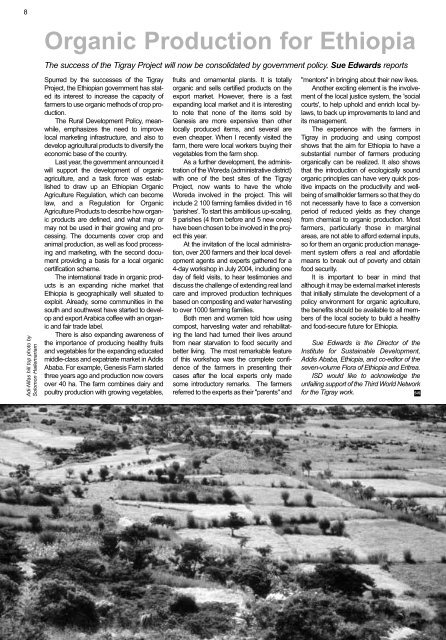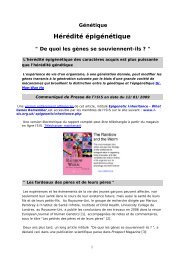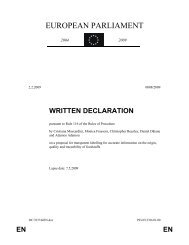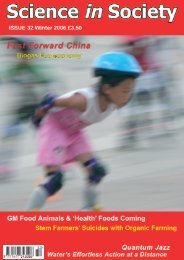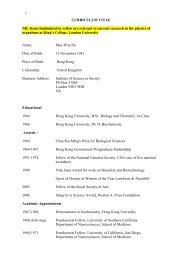Ethiopia goes organic to feed herself - The Institute of Science In ...
Ethiopia goes organic to feed herself - The Institute of Science In ...
Ethiopia goes organic to feed herself - The Institute of Science In ...
You also want an ePaper? Increase the reach of your titles
YUMPU automatically turns print PDFs into web optimized ePapers that Google loves.
8<br />
Organic Production for <strong>Ethiopia</strong><br />
<strong>The</strong> success <strong>of</strong> the Tigray Project will now be consolidated by government policy. Sue Edwards reports<br />
Adi-Nifas hill <strong>to</strong>p pho<strong>to</strong> by<br />
Solomon Hailemariam<br />
Spurred by the successes <strong>of</strong> the Tigray<br />
Project, the <strong>Ethiopia</strong>n government has stated<br />
its interest <strong>to</strong> increase the capacity <strong>of</strong><br />
farmers <strong>to</strong> use <strong>organic</strong> methods <strong>of</strong> crop production.<br />
<strong>The</strong> Rural Development Policy, meanwhile,<br />
emphasizes the need <strong>to</strong> improve<br />
local marketing infrastructure, and also <strong>to</strong><br />
develop agricultural products <strong>to</strong> diversify the<br />
economic base <strong>of</strong> the country.<br />
Last year, the government announced it<br />
will support the development <strong>of</strong> <strong>organic</strong><br />
agriculture, and a task force was established<br />
<strong>to</strong> draw up an <strong>Ethiopia</strong>n Organic<br />
Agriculture Regulation, which can become<br />
law, and a Regulation for Organic<br />
Agriculture Products <strong>to</strong> describe how <strong>organic</strong><br />
products are defined, and what may or<br />
may not be used in their growing and processing.<br />
<strong>The</strong> documents cover crop and<br />
animal production, as well as food processing<br />
and marketing, with the second document<br />
providing a basis for a local <strong>organic</strong><br />
certification scheme.<br />
<strong>The</strong> international trade in <strong>organic</strong> products<br />
is an expanding niche market that<br />
<strong>Ethiopia</strong> is geographically well situated <strong>to</strong><br />
exploit. Already, some communities in the<br />
south and southwest have started <strong>to</strong> develop<br />
and export Arabica c<strong>of</strong>fee with an <strong>organic</strong><br />
and fair trade label.<br />
<strong>The</strong>re is also expanding awareness <strong>of</strong><br />
the importance <strong>of</strong> producing healthy fruits<br />
and vegetables for the expanding educated<br />
middle-class and expatriate market in Addis<br />
Ababa. For example, Genesis Farm started<br />
three years ago and production now covers<br />
over 40 ha. <strong>The</strong> farm combines dairy and<br />
poultry production with growing vegetables,<br />
fruits and ornamental plants. It is <strong>to</strong>tally<br />
<strong>organic</strong> and sells certified products on the<br />
export market. However, there is a fast<br />
expanding local market and it is interesting<br />
<strong>to</strong> note that none <strong>of</strong> the items sold by<br />
Genesis are more expensive than other<br />
locally produced items, and several are<br />
even cheaper. When I recently visited the<br />
farm, there were local workers buying their<br />
vegetables from the farm shop.<br />
As a further development, the administration<br />
<strong>of</strong> the Woreda (administrative district)<br />
with one <strong>of</strong> the best sites <strong>of</strong> the Tigray<br />
Project, now wants <strong>to</strong> have the whole<br />
Woreda involved in the project. This will<br />
include 2 100 farming families divided in 16<br />
'parishes'. To start this ambitious up-scaling,<br />
9 parishes (4 from before and 5 new ones)<br />
have been chosen <strong>to</strong> be involved in the project<br />
this year.<br />
At the invitation <strong>of</strong> the local administration,<br />
over 200 farmers and their local development<br />
agents and experts gathered for a<br />
4-day workshop in July 2004, including one<br />
day <strong>of</strong> field visits, <strong>to</strong> hear testimonies and<br />
discuss the challenge <strong>of</strong> extending real land<br />
care and improved production techniques<br />
based on composting and water harvesting<br />
<strong>to</strong> over 1000 farming families.<br />
Both men and women <strong>to</strong>ld how using<br />
compost, harvesting water and rehabilitating<br />
the land had turned their lives around<br />
from near starvation <strong>to</strong> food security and<br />
better living. <strong>The</strong> most remarkable feature<br />
<strong>of</strong> this workshop was the complete confidence<br />
<strong>of</strong> the farmers in presenting their<br />
cases after the local experts only made<br />
some introduc<strong>to</strong>ry remarks. <strong>The</strong> farmers<br />
referred <strong>to</strong> the experts as their "parents" and<br />
"men<strong>to</strong>rs" in bringing about their new lives.<br />
Another exciting element is the involvement<br />
<strong>of</strong> the local justice system, the 'social<br />
courts', <strong>to</strong> help uphold and enrich local bylaws,<br />
<strong>to</strong> back up improvements <strong>to</strong> land and<br />
its management.<br />
<strong>The</strong> experience with the farmers in<br />
Tigray in producing and using compost<br />
shows that the aim for <strong>Ethiopia</strong> <strong>to</strong> have a<br />
substantial number <strong>of</strong> farmers producing<br />
<strong>organic</strong>ally can be realized. It also shows<br />
that the introduction <strong>of</strong> ecologically sound<br />
<strong>organic</strong> principles can have very quick positive<br />
impacts on the productivity and wellbeing<br />
<strong>of</strong> smallholder farmers so that they do<br />
not necessarily have <strong>to</strong> face a conversion<br />
period <strong>of</strong> reduced yields as they change<br />
from chemical <strong>to</strong> <strong>organic</strong> production. Most<br />
farmers, particularly those in marginal<br />
areas, are not able <strong>to</strong> afford external inputs,<br />
so for them an <strong>organic</strong> production management<br />
system <strong>of</strong>fers a real and affordable<br />
means <strong>to</strong> break out <strong>of</strong> poverty and obtain<br />
food security.<br />
It is important <strong>to</strong> bear in mind that<br />
although it may be external market interests<br />
that initially stimulate the development <strong>of</strong> a<br />
policy environment for <strong>organic</strong> agriculture,<br />
the benefits should be available <strong>to</strong> all members<br />
<strong>of</strong> the local society <strong>to</strong> build a healthy<br />
and food-secure future for <strong>Ethiopia</strong>.<br />
Sue Edwards is the Direc<strong>to</strong>r <strong>of</strong> the<br />
<strong><strong>In</strong>stitute</strong> for Sustainable Development,<br />
Addis Ababa, <strong>Ethiopia</strong>, and co-edi<strong>to</strong>r <strong>of</strong> the<br />
seven-volume Flora <strong>of</strong> <strong>Ethiopia</strong> and Eritrea.<br />
ISD would like <strong>to</strong> acknowledge the<br />
unfailing support <strong>of</strong> the Third World Network<br />
for the Tigray work.<br />
SiS


